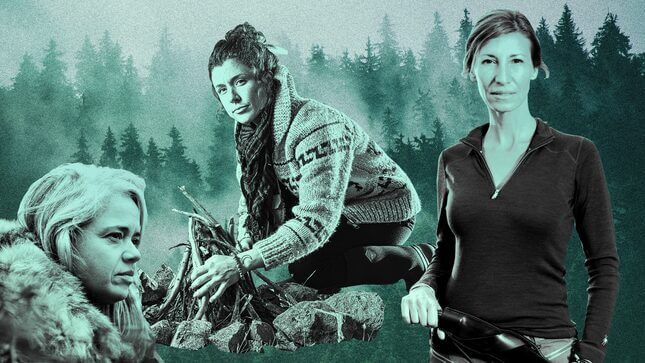A Woman Alone: On History’s Survival Show, There’s No Escaping Gender, Not Even in the Woods
The show features close encounters with fearsome predators and grisly injuries involving everything from axes to fishing hooks.
In Depth
Graphic: Elena Scotti (Photos: Shutterstock, A&E Networks)
While living in a hut on Vancouver Island for History’s popular reality-TV series Alone, Nicole Apelian fished for salmon alongside a family of black bears and listened to packs of wolves howling into the night. She was stalked by a cougar on multiple occasions. “I slept with my knife next to me and my axe by the door of my shelter,” she said of her experience on the show, which sends contestants into the remote wilderness to film themselves without a camera crew as they try to survive. It wasn’t fear of wild animals that made Apelian keep weapons at her bedside: Bears, wolves, cougars—they’re all predictable, she explains. Apelian was worried about humans.
“I was in a cove by myself in the middle of nowhere and there are boats around,” she said. “My main concern was, boy, if someone knows I’m here and comes by—.” She continued, “It’s a scary thing, having lived through that more than once: violence perpetrated on me by men, which I was sometimes able to stave off and sometimes wasn’t.”
This particular fear never made it on television, but it was plainly visible to me while watching the show. The potential terrors of the series are many: it equips 10 people with camera gear and limited survival equipment, drops them off in the woods, and dangles the prize of $500,000 for the contestant who lasts the longest. The show features close encounters with fearsome predators and grisly injuries involving everything from axes to fishing hooks. Still, as I binged all seven seasons over the course of a couple months and daydreamed about stepping into a pair of camo rain boots and making my own gill net, it wasn’t the prospect of being pounced on by a mountain lion that interrupted the fantasy, but rather the specter of some creep finding me in the woods.
Bears, wolves, cougars—they’re all predictable, she explains. Apelian was worried about humans
Much of my obsessive love for Alone revolves around elementary examples of upending traditional notions of gender: a woman chopping wood, a woman skinning a porcupine, a woman building a shelter. It isn’t that I doubted women’s ability to excel at those tasks, it’s just thrilling to actually see it—and bittersweet to imagine what it might have meant to see it sooner. (It is no surprise that the women of Alone report receiving scads of fan mail from little girls, and their parents, who view them as role models.) Ultimately, though, my Alone reveries are about transcending gender; being a person, just a person, in nature. But the women on the show never fully escape womanhood, whether it’s in their actual survival experiences or the intrusions of “real world” gendered realities or the editing of the show or the sexist fan reactions or even my own identified projections.
There is no escaping the realities, and resonances, of a woman alone. You can disconnect, go off-grid, and thrive in the remote wilderness, and yet a Zodiac boatload of gendered baggage often follows.
Although I discovered Alone on Netflix, it comes from History, a cable channel known for pseudoscientific documentaries like Ancient Aliens, as well as chest-puffing reality-TV enterprises such as Ax Men (“loggers across America are putting everything they have on the line to pull through and keep their businesses afloat”). Collectively, its slate of shows gazes romantically toward a traditional bygone era of manhood and America, while occasionally regarding contemporary reality through the lens of conspiracy (see: documentaries on Bigfoot, UFOs, and “10 Ways the World Will End”).
It is no surprise that History would launch a show that concocts a scenario in which traditionally masculine skills save the day. It’s the reality-TV version of another of the channel’s shows, The Men Who Built America: Frontiersmen, a documentary about men who “set forth across uncharted land with determination and self-reliance.” In fact, the first season of Alone featured 10 men and zero women. It was only with season two that women were introduced to the series, and each season since has been marginally co-ed, with no more than three women. It remains overwhelmingly white.
Some fans of the show reacted skeptically to the post hoc inclusion of women. Callie North, who appeared on season three, observed of the social media viewer backlash, “A lot of the comments were, ‘There’s no way women can do this. They can’t handle it with their menstruation, it’s going to cause emotional upset.’” The women on the show did more than just handle it. “It’s incredible how the narrative changed as the women, time and again, proved themselves to be not only equal, but also superior survivalists on average to the men,” she said.
-

-

-

-

-

-

-

-

-

-

-

-

-

-

-

-

-

-

-

-

-

-

-

-

-

-

-

-

-

-

-

-

-

-

-

-

-

-

-

-








































